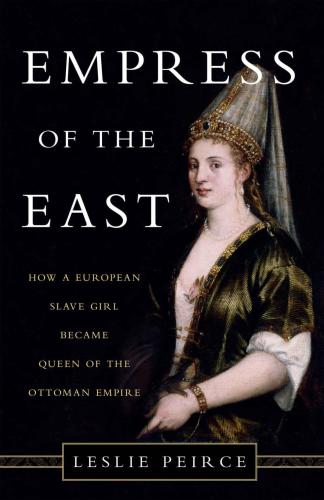
Empress of the East
How a European Slave Girl Became Queen of the Ottoman Empire
کتاب های مرتبط
- اطلاعات
- نقد و بررسی
- دیدگاه کاربران
نقد و بررسی

July 31, 2017
Peirce (Morality Tales), professor of history at NYU, successfully portrays the Ottoman Empire’s most famous concubine as a woman who parlayed her enslaved status into becoming Suleyman the Magnificent’s queen and a significant philanthropist—all while being unable to appear in public. Using her surviving correspondence and contemporary 16th-century accounts, Peirce fleshes out the queen’s life in a court that seldom recorded women’s activities. As a young slave, the Ruthenian girl, nicknamed Roxelana (her given name, birth date, and exact birthplace remain unknown), tellingly received the Persian name Hürrem, meaning joyful. She later laid the foundation of diplomatic correspondence between powerful women of the East and West. Westerners of that era obsessed over the brief sexual careers of harem members, but Ottoman tradition gave high-ranking members the special role of overseeing the transformation of their singleton princes into potential heirs. Roxelana’s unique position as the probable emotional intimate of the sultan and the mother of multiple princes allowed her to create a strong family unit that, for those same reasons, came into conflict with Ottoman tradition. Peirce’s knowledge of Turkish culture shines through objective, well-reasoned explanations of Eastern law and customs. Fascinating from beginning to end, Peirce’s telling of Roxelana’s story illuminates her remarkable life and the evolution of a long-lived empire that straddled two continents. Illus.

October 1, 2017
Peirce (history & Middle Eastern & Islamic studies, New York Univ.; Morality Tales) offers a fascinating journey into the palace of Ottoman leader Suleiman the Magnificent (1494-1566), who ruled for over three decades. This book tells the story of how power passes from one generation to the next, and how women played a large part in governing, diplomacy, and philanthropy during this era. Slaves from lands conquered by the Ottomans were brought to the palace, including Roxelana, a young Christian woman from Russia who was trained for the royal harem. The training involved an education in Islam and the arts, with the ultimate goal of bearing a child for the ruling Ottoman sultan or their princes. Roxelana became so dear to Suleiman that, contrary to custom, he freed and married her. After having several sons, Roxelana became involved in a level of diplomacy that was unusual for the time, acting in foreign affairs on Suleiman's behalf. This book is rich with sources from Ottoman, Islamic, and Venetian writers and poets, creating an intimate history. Peirce tells this family history in a moving and understated way. VERDICT For all readers interested in the Ottoman Empire. The power and influence of women and their impact in the diplomatic world is carefully sketched here.--Amy Lewontin, Northeastern Univ. Lib., Boston
Copyright 2017 Library Journal, LLC Used with permission.

























دیدگاه کاربران